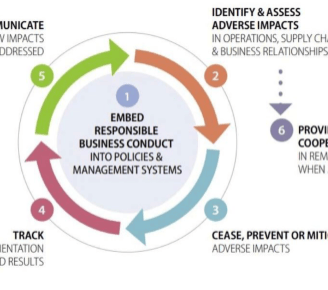Iselin Human Rights - That Human Rights Company - Helping Businesses Since 2003
Space Law and Human Rights: The importance of ethical corporate conduct
SPACE LAWHUMAN RIGHTSLAW
Sophia Monney
9/1/20247 min read


The activities undertaken in space, particularly those pertaining to space-based technologies, have a substantial effect on life on Earth. The effects of such creations extend to multiple domains, encompassing human health, the environment, education accessibility, communication systems, and the ability to provide humanitarian assistance during times of crisis. This issue can be attributed to the absence of robust enforcement and monitoring mechanisms in the context of space activities. Due to this, both states and private entities have been increasingly utilizing this environment for military and commercial purposes, inevitably impacting individuals’ ability to exercise and enjoy basic human rights. This particular matter is within the purview of the private sector, which comprises three-quarters of what is currently recognized as “the global space economy.” Accordingly, the primary objective of this paper is to delve into the interplay between space law and human rights, with the purpose of acknowledging the inherent symbiosis between these two fields. Moreover, it aims to underscore the criticality of corporate accountability and the merits of ethical corporate practices in relation to space endeavors.
What is space law?
The main components of Space Law consist of International Law, specifically five international treaties that govern space activities: The Outer Space Treaty (OST), the Rescue Agreement, the Liability Convention, the Registration Convention, and the Moon Agreement. Each of the following focuses on distinct areas and principles that govern space, for which states bear international responsibility. Moreover, the International Space Station Intergovernmental Agreement (IGA) plays a vital role in the development of space law. The agreement, which was signed in 1998, involved the states participating in the Space Station project and the European Space Agency. Nevertheless, it is imperative to acknowledge the inherent nature of these laws and the absence of definitive binding instruments concerning outer space, state conduct, and human rights.
What is international human rights law?
Human rights laws and principles are present in various regional and international treaties. The concept began to take shape after the conclusion of World War II, with the adoption of the UN Charter in 1945. The charter sought to reaffirm the organization’s belief in the importance of fundamental human rights and the inherent dignity of all human beings. This change acknowledged the individual as the subject of rights in relation to their affiliation with a state.
The language was adopted in the Universal Declaration on Human Rights in 1948, underscoring the recognition of equal and inalienable rights for all individuals, which are duly protected by the rule of law. Furthermore, the International Covenant on Civil and Political Rights (ICCPR) and the International Covenant on Economic, Social, and Cultural Rights (ICESCR) were simultaneously formulated. The creation of the International Bill of Human Rights resulted from the implementation of these three treaties, which assigned states with both positive and negative obligations. Furthermore, the extraterritorial application of human rights can be observed in the advisory opinion of the International Court of Justice regarding the Legal Consequences of the Construction of a Wall in the Occupied Palestinian Territory. According to the ICJ, state parties to the ICCPR are obliged to comply with its provisions, even in cases where jurisdiction is exercised outside national territory. Hence, it can be concluded that, in instances of effective control, the same obligations could potentially be broadened to encompass the utilization of space and outer space. The conduct of corporations can be attributed to states, giving rise to state responsibility for any violations caused by these firms. Nonetheless, it is imperative to remember that there are particular regulations pertaining to this issue, and the process of determining the nationality of a corporation can at times be intricate. Nonetheless, all businesses have an internationally recognised responsibility to respect human rights across all of their activities and throughout their operations and partnerships as outlined in the UN Guiding Principles on Business and Human rights in 2011
.
The consequences of human activities in outer space on human rights
Rights relating to Access of Information
Over the years, a significant number of states have expanded their involvement in space endeavors, with 195 United Nations Member States currently engaged in space activities, contributing to the development of their domestic capabilities. However, when considering this from a contrasting standpoint, it signifies that roughly two-thirds of global countries presently lack space capabilities, thereby exposing them to an escalating vulnerability resulting from the substantial disadvantage they confront in terms of development. The association of this issue can be established with the right to benefit from scientific progress and its applications, as articulated in Article 27 of the UDHR and Article 15 of the ICESCR. Similarly, this right can be attributed to the right to education, the right to seek, receive and impart information and the right to development. These rights have a notable effect on one’s capacity to fully experience the advantages of progress, particularly in the field of scientific advancements and their practical implementations. To illustrate, remote sensing technologies employ electromagnetic waves emitted and reflected by sensed objects to enhance various aspects such as natural resource management, land use, environmental protection, and, most notably, aid delivery. These strategies have been empirically demonstrated to rectify the negative repercussions of globalization, notably by eradicating poverty.
Rights relating to life and the environment
By virtue of Article 6 of the ICCPR, international human rights law recognizes the fundamental right to life. Likewise, the recognition of the right to a clean environment has experienced a surge, emerging as a significant concern intertwined with the rights to safety, self-determination, and food, all of which are under threat due to climate change. When assessing the influence of space activities to these rights, it is essential to draw attention to the significant issue of space debris, commonly referred to as “space junk.” As of January 2019, estimates suggest that the Earth’s orbit contained more than 128 million debris fragments smaller than one centimeter, approximately 900,000 debris pieces measuring one to ten centimeters, and around 34,000 debris fragments larger than ten centimeters. This is influenced by the presence of space objects, various launch stages, and the aftermath of space object explosions, conjunctions, or intentional destruction. Initiatives to address this problem have been outlined by the UN Space Debris Guidelines, European Space Agency, and several domestic agencies in Japan, China, Germany, and the United Kingdom. Moreover, another topic that has generated concern is the issue of space mining, given its potential to yield precious resources and generate substantial financial gains. However, our understanding of the environmental implications of mining in space remains limited, thus potentially jeopardizing the principle of intergenerational equity, which mandates that each subsequent generation should inherit the Earth in a condition no worse than it was received. Clearly, companies must bear in mind the importance of this and ensure compliance with their obligations under international space law and other national regulations.
Rights relating to humanitarian law and armed conflict
The increasing weaponisation of outer space raises concerns about various fundamental rights, such as the right to life, the right to a secure environment, the right to development, the right to peace, and more. Additionally, the potential ramifications of military operations in space, which could have lasting effects on individuals’ ability to utilize space in the future, will undoubtedly have a negative impact on multiple other rights concerning the sustainable utilization of space for both present and future generations. Despite the current absence of warfare in space, there have been recent requests to officially recognize space as a domain for military maneuvers. For instance, data is gathered from outer space for the purpose of military operations on Earth, and space resources play a pivotal role in directing military activities, serving as an essential element of a major power’s military capacity. Consequently, it is of utmost importance for both states and companies operating in space to enhance their initiatives in regulating this novel frontier, so as to prevent the proliferation of weapons and the potential outbreak of armed hostilities in space.
Benefits of companies applying human rights policies
1. Increasing revenue:
As stated earlier, space is abundant with a wide range of natural resources that possess exceptional monetary value. Accordingly, it is essential for companies to prioritize sustainable practices that offer long-term advantages and support the conservation of resources. This will inevitably also bring them into compliance with international human rights laws, with a particular focus on the principles of intergenerational equity.
2. Risk mitigation:
Given the growing significance of corporate accountability on a global scale, it is prudent for companies to adopt ethical and moral principles by revising their policies for long-term benefits. The adoption of this approach will not only ensure the long-term viability of the company, but also effectively address any potential crises and concerns arising from their activities in outer space and their impact on human rights.
3. A new era of customers:
Given the growing attention to ethics and morals among the youth, companies that demonstrate a commitment to fulfilling their international and domestic human rights obligations will not only appeal to a larger pool of investors, but also attract a wider customer base compared to their competitors. The positive impact of this will be felt by companies, as it will enhance their funding and revenue, while concurrently minimizing the risk of reputational costs resulting from non-compliance with human rights obligations.
Applying human rights into companies
Due diligence process and supporting measures (source: OECD Due Diligence Guidance for Responsible Business Conduct 2018).
1. Embed human rights into company policies and management systems; make company policy public and communicate it to personnel, supply chain, business partners.
2. Identify and assess adverse human rights impacts of own operations, supply chain, and business partners; this scoping exercise should enable the company to carry out an initial prioritisation of the most significant risk areas for further assessment.
3. Cease, prevent, or mitigate adverse human rights impacts; stop activities that are causing or contributing to adverse impacts; develop and implement plans to prevent and mitigate potential (future) adverse impacts.
4. Track implementation and results of the companies’ human rights due diligence activities; include lessons learned to company due diligence process.
5. Communicate internally and externally, which adverse impacts have been identified and what the company is doing to prevent, mitigate, and cease them; include the findings and outcomes of those activities.
6. Provide for or cooperate in remediation, if the company has caused or contributed to an adverse human rights impact.
Bibliography:
1. Freeland, Steven, and Danielle Ireland-Piper. “Space Law, Human Rights and Corporate Accountability.” UCLA Journal of Intentional Law and Foreign Affairs, 2022, escholarship.org/content/qt3636p0sp/qt3636p0sp.pdf?t=r95q79.




